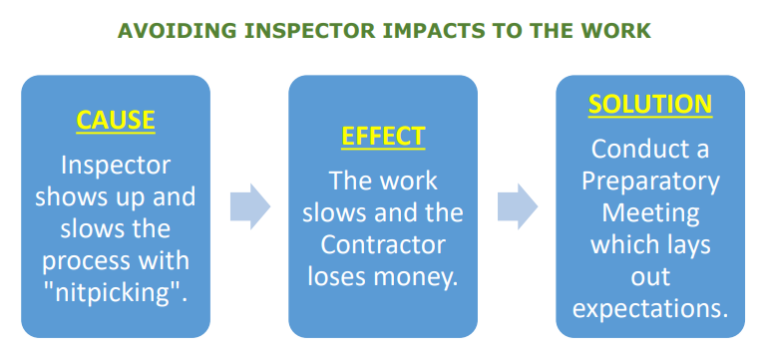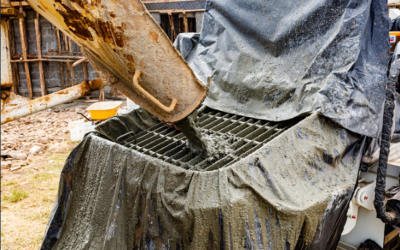Executive Summary. Federal construction work usually requires three phases of quality control within the work: the preparatory, initial, and follow-up phases. If you, as a contractor or owner, do not want to try incorporating all three just try one. Try the preparatory phase.
The Feds and the three phases. Federal agencies, say for example the Corps of Engineers, require that construction work be executed by the Contractor using three phases of control:
• Preparatory Phase – this is the phase prior to the work wherein the Contractor and Owner prepare for the work.
• Initial Phase – this phase is supposed to start just before the work actually begins; however, we have been considering the start of the initial phase to be just after the work has begun. The point of stopping here and assessing is to ensure that the work has started in the manner agreed upon in the preparatory phase.
• Follow-up Phase – following up on the contractor confirms for the owner that the work is being constructed consistently and correctly.
Establishing a solid foundation. They say that the most important part of your home’s construction is the foundation. It’s because absolutely everything in your home rests upon it. This can be said about the Preparatory Phase. Whatever you establish in the preparatory meeting will serve as the guide to the work.

The preparatory meeting will confirm the Contractor’s understanding of the required final installation as dictated by the Contract. Although the means and methods will be up to the Contractor, the final product must conform.
This is the point of this meeting: it is the owner saying “I don’t care how you get there, but we’ll be looking for these things along the way, and the final product needs to look like the drawings do and in conformance with what these specs say.”
Contractors wing it. The reason the preparatory meeting is so valuable is because, without it, Contractors will wing it. Contractors care about profit. And most contractors think that these stupid meetings, “dog and pony shows”, put on for Owners because of a stupid specification requirement, take away from getting real work executed in the field.
As a Contractor, why should I do preparatory meetings? If we can agree that inspectors usually get in the way more often than they don’t, and that this causes the Contractor to lose money, it follows that agreement between Contractor and inspector before the work will reduce slowing in the work. Because
in this preparatory meeting, the inspector was present (and maybe even the Owner) and that was the time to have learned the bulk of things that were going to hold the Contractor up.
As an Owner, why should I do preparatory meetings? Three main reasons and not in any particular order. The first is to use the time to learn more about the work itself. The second reason is to ensure that the Contractor has read the specifications and plans, and actually knows the work. The third reason is to check to make sure that all submittals have been received and approved, and to learn which RFIs (requests for information) have affected the work. Ultimately, it just gives an inspection team the confidence that the work will comply with the Contract.
What’s the preparatory meeting agenda look like? The agenda may be listed
in the specification, but if not, here is a suggestion:
I. Introduction of the parties and their roles.
II. Listing of applicable specification sections.
III. Listing of applicable drawings.
IV. Applicable submittals and their status.
V. Applicable RFIs and their status.
VI. Contractor’s proposed means and methods.
VII. Owner’s expectations.
VIII. Safety in the work.
IX. Questions & Discussion
The Contractor should lead this meeting and the Contractor should bring applicable
handouts.
My story. In my own construction company, we did a little bit of federal work. Since I hadn’t done federal projects with my previous employer, I found the meetings to be a waste of time and in the way of the work. On my first job with the Corps of Engineers, however, we lost money. About 7%. Looking back, older and wiser now, maybe I should have paid more attention to those meetings.
And learned from them.
As an owner’s representative, who is responsible for ensuring quality, I find these meetings to be invaluable. More often than not, the Contractor knows the work more than the Owner. That’s because they have been doing phone calls to vendors, lift drawings, digging deep into the Contract to look for shortcuts, and making submittals and RFIs. Also, the staff for a Contractor is usually larger, thus allowing more eyes to be upon each activity.
Bottom line: as a Contractor or Owner, do these meetings. The preparation will get easier as you do more, and it will force both parties to know the work and to be aligned prior to execution. This is more profitable for the Contractor and less aggravating for the Owner.
Work safe!






0 Comments